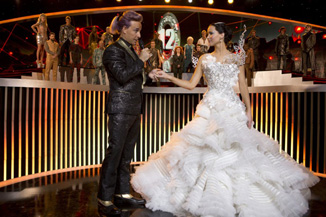|
|
Book vs. Movie: Catching FireBy Ben GruchowNovember 4, 2015
Since the entirety of Catching Fire is limited to Katniss’ point of view, we are reduced to hypothesizing about the tone and tension behind events. And as it turns out, the Games are a sham from both sides; Snow is using them to surreptitiously rid himself of the symbol of a burgeoning political revolution, while the revolution is using them to reveal itself to the country by saving, extracting, and taking possession of the same symbol (Katniss, in both cases). This theme of manipulation for political gain or progress culminates in Mockingjay, but the seeds were planted and begin to grow here. The first half of Catching Fire is possibly the most solid and structurally-sound writing in the series, and the second half contains most of the foundation upon which the trilogy constructs its final conflicts. The Movie As this column is being finalized, Lionsgate CEO Tim Palen has outlined a firm plan to contract out development of several Hunger Games-themed park attractions, ranging from recreations of District 12 to simulations of Capitol train travel to, of all things, Peeta Mellark’s bakery. Mind you, this is the CEO who has shepherded all of the adaptations to the screen. Certainly, the concept of a real-life Hunger Games theme park is astonishingly tone-deaf to what the trilogy concludes about commoditizing violence and death (especially for the sake of pitching a narrative to a mass audience), but it’s even more so coming from a studio that presumably has been aware of these themes for years.
|

|
|
|

|
Friday, November 1, 2024
© 2024 Box Office Prophets, a division of One Of Us, Inc.


